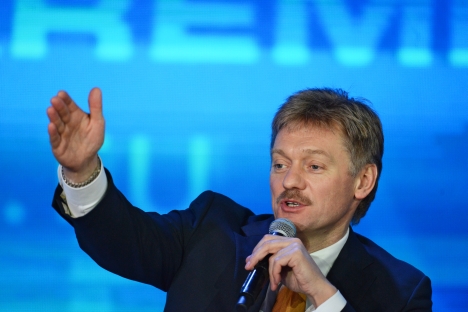Kremlin allows last American adoptions to go ahead

President Vladimir Putin’s spokesman Dmitry Peskov: “In cases where certain legal procedures haven’t been finalized, a total ban on adoptions by American parents will be applied.” Source: RIA Novosti / Alexander Petrov
Russian children whose adoption by American families has been approved by a Russian court will be allowed to join their prospective adoptive parents, despite the fact that a ban on Americans adopting Russian children came into force January 1, President Vladimir Putin’s spokesman Dmitry Peskov said Thursday.
Related:
When orphans used as a geopolitical tool
Was the Magnitsky Act Inevitable?
“In cases where certain legal procedures haven’t been finalized, a total ban on adoptions by American parents will be applied,” Peskov told Dozhd TV, a liberal online TV station, less than three days ahead of a major opposition rally in Moscow that will protest the adoption ban.
The adoption ban was passed by lawmakers speedily late last year in retaliation for the U.S. passing the Magnitsky Act, which blacklists Russians implicated in the death of lawyer Sergei Magnitsky in a Moscow pre-trial detention center in 2009. Magnitsky had exposed a fraudulent tax rebate scheme through which law enforcement officers allegedly siphoned off at least $230 million from Russia’s state budget but were never prosecuted.
Peskov’s comments appeared to overrule an earlier statement made by the Kremlin’s Commissioner for Children’s Rights, Pavel Astakhov, in late December. Astakhov told the Interfax news agency that 46 children cleared to join their new American families would stay in Russia after the adoption ban came into force.
Peskov’s statement also came a day after Russia’s Foreign Ministry emphasized that the adoption agreement with the U.S., which had taken effect as recently on November 1, 2012, would not be revived.
“The Foreign Ministry officially handed over a note to the U.S. Embassy in Moscow on Jan. 1 this year notifying [the U.S. that Russia is] revoking, not suspending the agreement,” the ministry said in a statement on its website. “Any other interpretations and attempts to distort our position are not to be allowed. We have revoked the agreement.”
The Foreign Ministry’s statement dashed hopes expressed by the U.S. government that adoptions in the process of being completed would be allowed to go ahead. Speaking shortly after the Russian Foreign Ministry statement, U.S. State Department Victoria Nuland told a press briefing in Washington: “We are very hopeful that we will be able to complete the cases of adoption that had been begun before the law was passed.”
Further clarifying Russia’s stance, Deputy Foreign Minister Sergei Ryabkov told the Kommersant daily in comments published Thursday that “even though the agreement says that it remains in effect for a year after either party repudiates it, it won’t be applied in practice.”
Kommersant also cited a Kremlin administration source as saying that Russia would not continue to monitor the conditions under which adopted Russian children are living in the United States, as it would be using “something we broke off.”
Meanwhile, the pro-Kremlin United Russia party, which has a majority in Russia’s lower house of parliament, the State Duma, plans to introduce a bill banning virtually all foreign adoptions, excepting only France and Italy, with which Russia has existing bilateral agreements. The bill will be introduced “in a week or two,” the Itar-Tass news agency cited the bill’s sponsor, Yevgeny Fyodorov, as saying Thursday.
“[The bill holds that] the export of children can be carried out only in the countries that Russia has bilateral agreements with. There are two such countries now – France and Italy,” Fyodorov said.
“In essence, it’s a purchase,” he said of foreign adoptions. “No civilized country allows the slave trade or sells children abroad.”
The comments by senior officials in Moscow came as Russian media reported that a 14-year-old orphan with a debilitating disease living in the Urals city of Chelyabinsk, Maxim Kargapoltsev, had appealed to President Putin asking him to let an American couple, with whom he has been in touch with for seven years, to adopt him.
Kargapoltsev later denied in a video interview with the RIA Novosti news agency that he had made an appeal to Putin. He explained that last December a local journalist contacted the orphanage where he lives to shoot a film about it. While interviewing Maxim, the correspondent asked him what he would ask the president.
“I’d say I want to go to America,” Kargapoltsev told RIA Novosti in the video. “But that wasn’t a direct appeal, an oral appeal, an appeal in a letter, e-mail or file, or even through the media.”
Three weeks before the adoption ban came into force, Chelyabinsk authorities turned down the American couple’s application to adopt Kargapoltsev, citing mistakes in the papers they submitted.
On Thursday, a nationalist State Duma deputy from the Chelyabinsk region, Sergei Vainshtein of the Liberal Democratic Party of Russia, announced that he and his wife were going to become Kargapoltsev’s foster parents, even though the couple had never met him before.
“My wife and I have long been considering fostering an orphan, we support several orphanages in the Chelyabinsk region,” Vainshtein was quoted by his party’s press office as saying.
Later a message appeared on Kargapoltsev’s page on the Vkontakte social network to journalists, which said: “Please don’t try to take an interview, ask for a talk, etc. All questions [should go] through our director.”
But three days earlier, Kargapoltsev had sent a rueful Twitter message: “It’s a shame you can’t choose your parents. It’s a shame you’re never asked if you wish to have been born.”
The article is based on materials from ITAR-TASS, Kommersant, RIA Novosti, Gazeta.ru, Dozhd TV Channel.
All rights reserved by Rossiyskaya Gazeta.
Subscribe
to our newsletter!
Get the week's best stories straight to your inbox